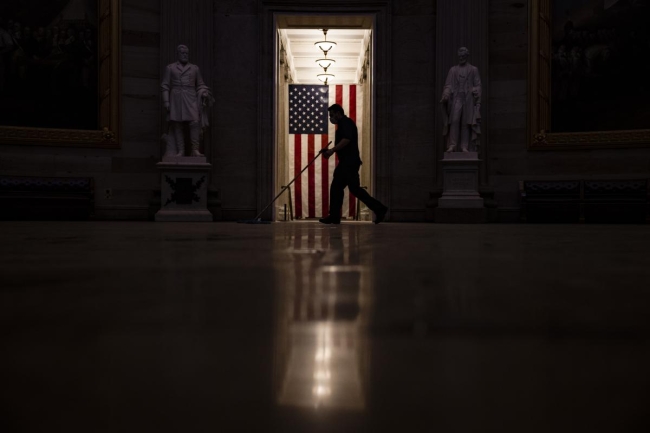You have /5 articles left.
Sign up for a free account or log in.

A worker sweeps up the dust and debris that was left behind by a pro-Trump mob in the Rotunda of the U.S. Capitol building.
Samuel Corum/Stringer via Getty Images
College and university leaders widely condemned Wednesday’s storming of the U.S. Capitol by President Trump’s supporters. But in a handful of cases, the words they didn’t say might have been louder than those they did.
Leaders at some universities that gave Trump a platform in higher education when he was first running for president -- along with legitimacy in the conservative Christian movement that helped propel him into office -- initially said nothing at all.
Most notably, the president of Liberty University, Jerry Prevo, issued no statement Wednesday. Liberty, located in Lynchburg, Va., gave Trump a prominent platform early in his 2016 presidential campaign, and he has appeared at the university multiple times, including speaking at its commencement in 2017.
A spokesman for Liberty said the university was largely shut down for the Christmas holiday and pointed to social media statements from its Falkirk Center think tank, which called for prayer and ending violence. Then, Thursday, Liberty’s former president, Jerry Falwell Jr., a key Trump backer who was ousted from the Liberty presidency last year, said, “There is no way to defend the actions of those rioters” during a telephone interview with Inside Higher Ed. Shortly afterward, Prevo -- who was Liberty’s longtime board chair before becoming its president -- issued a statement that did not mention Trump.
Letters to the Editor
A reader has submitted
a response to this article.
You can view the letter here,
and find all of our Letters to
the Editor here.
“As we mourn the violence and destruction that unfolded before our eyes yesterday, let us look to the One who put the planets in motion and holds the stars in His hands. He is still the Prince of Peace, and He is still Emmanuel -- God with us,” it said. “Therefore, let us humbly seek Him on our knees together. God can pick up the pieces of our wounded nation and heal us. He can renew our hearts and our love for each other until we are once again one nation under God and indivisible. He is our only true hope.”
Hillsdale College, whose president, Larry Arnn, the White House tagged last month to lead a 1776 Commission on “patriotic education,” had issued no statements about the events at the Capitol through public channels as of Thursday afternoon. Hillsdale didn’t return requests for comment. Its most recently posted news release was about the 1776 Commission, stating that in addition to Arnn’s involvement, Hillsdale’s vice president of Washington, D.C., operations was appointed executive director to lead the commission.
Administrators at other conservative universities took different paths. Bob Jones University issued no statement, according to a spokeswoman. Pat Robertson, the founder, chancellor and CEO of Regent University, addressed the events at the Capitol on The 700 Club.
“There was a madness yesterday, and it came on Donald Trump,” he said at the start of the show. “And people had been hoping and hoping he had his own people in the Senate all ready to fight for him. Congress was ready, Ted Cruz was ready, and so what does Trump do? He goes crazy and he urges his huge crowd that came to Washington to support him to take a march on the Capitol. And suddenly -- there may have been some ringers that went into that group as well, we don’t know if there were some people as well -- but they took over the Capitol, they invaded the offices and just did a horrible thing. And instead of supporting him, now the people who were all lined up to have a hearing on every one of those voter fraud claims was no longer able to do anything -- they couldn’t wait to vote against him.”
Those comments were different in style and substance from those issued by two universities that often found their names near Trump’s in the last four years. The president of the University of Notre Dame, the Reverend John I. Jenkins, made headlines this fall for traveling to the White House for a Rose Garden ceremony at which Trump announced Amy Coney Barrett as his pick to fill a seat on the Supreme Court. Barrett, who went on to be confirmed to the court, is an alumna of Notre Dame Law School and taught there. Father Jenkins was criticized for not wearing a mask at the event, despite the pandemic. He apologized at the time. He was diagnosed with COVID-19 soon after attending the ceremony, reporting mild symptoms.
Father Jenkins issued the following statement on Wednesday’s events at the Capitol.
“Today's assault on Congress was unworthy of our democracy,” he said. “We pray for the nation and call on everyone, regardless of political affiliation, to condemn unequivocally the disruption of institutions designed to serve the common good.”
The University of Pennsylvania, meanwhile, is Trump’s alma mater. Its president, Amy Gutmann, and provost, Wendell Pritchett, issued a joint statement condemning the violence without mentioning Trump.
“Nothing is more foundational to American democracy than respect for the peaceful transfer of power,” it said. “Fueled by the dangerous propagation of falsehoods and disproven allegations, a mob on Wednesday assaulted this bedrock value of American democracy, storming our nation’s Capitol in an attempt to block the constitutionally mandated counting of certified electoral votes in our 2020 presidential election. As citizens, scholars, teachers, and university leaders dedicated to understanding, defending and strengthening American constitutional democracy, we join together with everyone who raises their voices and condemns threatening incitements and assaults on the political freedom of all citizens. We also join with our fellow Americans in praising those leaders of all parties who worked through the night to carry on the constitutional mission of recognizing the peaceful transfer of presidential power. May we now continue to work across divides to strengthen and secure our constitutional democracy.”
Contrast those statements to words from some other college presidents. Several specifically named Trump.
The president of Whitworth University, in Spokane, Wash., called on the president of the United States to call off a coup, for example. Even higher education associations in Washington, D.C. -- lobbying groups that aren’t always quick to get out in front of the pack -- called Trump by name.
“President Trump has failed to act in the best interests of the country or respond to his constitutional and moral obligations,” said Ted Mitchell, president of the American Council on Education.
Observers noted that the associations may have had some incentive to take a harder line. Trump’s political opponents, Democrats, are about to assume control of the executive and legislative branches of government. So too might some conservative college leaders have decided it was time to create some distance between their campuses and the Trump administration.
But the difference in language still raises the question of when higher education leaders should call out national leaders by name -- and whether those institutions that played a role in a politician’s rise to power and prominence have any additional responsibilities to hold him to account in a time of crisis.
It’s important to point out that a difference exists between college leaders who explicitly supported Trump and those who tried to support their faculty members -- or who are leading an institution Trump attended. This isn’t a question of guilt by association. It’s a question of whether that association gives leaders more responsibility when they speak and access to a greater bully pulpit.
Walter Kimbrough is one college president who has not shied away from seizing a bully pulpit or criticizing Trump. Kimbrough is president of Dillard University, in New Orleans. He compared Trump to a drug Wednesday, adding that Republicans and conservative pundits had been effectively serving as drug dealers.
Kimbrough cites among those influencing his leadership style Notre Dame’s former president the Reverend Theodore Hesburgh, former Morehouse College president and civil rights leader Benjamin Mays, and his own father, a United Methodist minister.
Some presidents don’t speak out because of pressures from their board or political considerations, Kimbrough said. He’s saddened by that. He stressed individual accountability.
“I think you need to call things by name so people can’t act like it doesn’t apply to them,” Kimbrough said in an email. “I’ve always been willing to do it. Trump to me was an existential threat to the values of education as a whole because my 12-year-old could not pass any test using the lies Trump gave.”
He was critical of institutions with ties to Trump or that associated with him.
“Liberty has blood on its hands for not getting rid of Falwell a long time ago,” Kimbrough said. “Jenkins is clearly no Hesburgh, but he lost all moral authority by going to the Supreme Court super-spreader announcement unmasked. Maybe the Penn team just isn’t interested in engaging this issue, which is fine, but they could [have] kept that statement. Thin words.”
In a telephone interview Thursday, Liberty’s former president, Falwell, rejected the idea that his words and his support for Trump contributed to a political climate that led to the storming of the Capitol.
“Absolutely not,” he said. “It’s what I think is the current in the country.”
He blamed the fact that “populists on the right and the radicals on the left” are dissatisfied with “the establishment.” He also said, “There’s no way to defend the actions of those rioters,” calling those actions terrorism and “not peaceful assembly.”
Speaking before Liberty's current president, Prevo, issued his statement, Falwell didn’t comment directly on whether his successor should comment publicly on the violence at the Capitol.
“It’s his prerogative whether to comment or not,” Falwell said. “He’s definitely been politically active during his career, and I suspect he probably will [comment] before the day is over. I can’t really comment on that, because I don’t know what his thinking is.”
The Falkirk Center, the Liberty subsidiary that issued statements before Prevo, is an amalgamation of Falwell’s name and the name of the founder of Turning Point USA, Charlie Kirk. It has in the past pushed the limits of political advertising allowed under nonprofit law in support of conservative politicians, including Trump.
The center’s page for Parler, a social media site popular with Trump supporters and conservatives, addressed the attack on the Capitol on Wednesday more directly than Falkirk’s other social media accounts.
“The violence underway at the Capitol is unacceptable & anti-American. We are a nation of law & order & we must work within our system of law. Pray for our nation, for our leaders, & our people, that we might uphold our Constitution & preserve our nation peaceably,” it said.
That post appeared shortly after one that read, “The fight is only lost when we decide to give up. When we stop praying, caring, and battling for our republic, then we no longer deserve to keep it. Never give up the fight for our nation!”
Dustin Wahl graduated from Liberty and is the founder of an alumni group called Save71, which pushes for leadership reform at the university.
“Liberty University’s leaders are responsible for promoting Donald Trump’s campaign from its earliest days,” he said in a text message. “And recently, Liberty’s Falkirk Center actively promoted lies about the 2020 election that led to the violence and chaos at the U.S. Capitol yesterday. Neither of those things are acceptable from any university, let alone one that claims to be Christian. Liberty owes everyone in America an apology, especially the students whose diplomas will forever be tied to the actions of their leaders.”
Liberty leaders have said Falkirk is nonpartisan and that its activities are consistent with promoting conservative Christian values.
Asked about the decision not to name Trump in Father Jenkins’s statement, a Notre Dame spokesman said the university had nothing to add. A Penn spokesman asked for additional comment said the university’s president and provost had full calendars Thursday.








